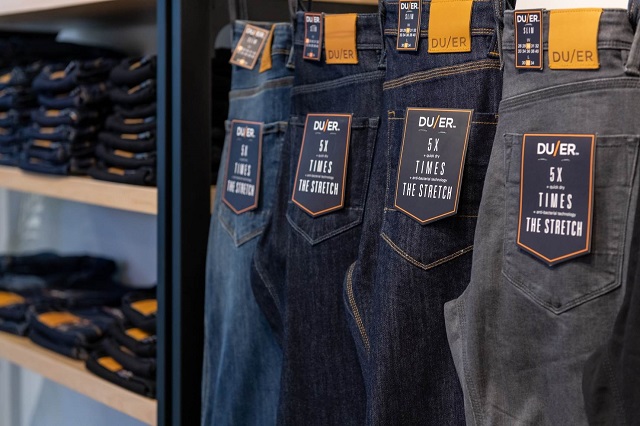June 2025 — A decade after revolutionizing the denim world with his performance-first brand Duer, Gary Lenett is entering a new phase of expansion—both in footprint and global ambition.
It all began in 2015 when Lenett, then 56 and already a heavyweight in North American denim manufacturing, swapped his car for a bicycle in a personal bid for healthier living. The change made him realize just how impractical traditional jeans were for active commuters. That moment of discomfort gave birth to innovation—performance denim with enhanced stretch and breathability. Backed by Kickstarter, Duer was launched with the promise of jeans that are five times more stretchable and 30% lighter than conventional denim.
Now, the Vancouver-based brand is surging forward. With nearly 1,000 wholesale accounts worldwide and eight company-owned stores across North America, Duer is preparing to open three more locations by September. These include a 2,500-square-foot flagship in downtown Victoria, British Columbia, a 1,000-square-foot shop on Hayes Street in San Francisco, and another in Portland, Oregon’s upscale Northwest 23rd district.
While many brands have pulled back from retail in cities like San Francisco and Portland post-pandemic, Lenett sees it as an opportunity rather than a risk. “We’re not reckless,” he said. “But prime locations don’t come up very often, and we already have a loyal customer base there through our wholesale and e-commerce operations.”
Looking ahead, Lenett envisions 30 to 40 Duer stores in North America in the next few years. With 80% of its products made in-house at its own factory, Duer is better positioned to navigate inflationary pressures, supply chain volatility, and tariff fluctuations. “We’ve held our prices and feel we can capture market share now while others are hesitant,” he said.
Europe is also firmly in Lenett’s sights. Duer has partnered with U.K.-based distributor Hectic Europe, with plans to scale up its existing e-commerce operations in the U.K. and Germany, followed by further expansion across 12 European and Nordic countries. While there are no immediate plans to open standalone stores in Europe, the focus will be on building brand recognition through wholesale channels and digital platforms.
“Our model is to build awareness through wholesale—just like we did with Nordstrom and REI here—and then scale from there,” Lenett noted. He aims for Europe to contribute about 15% of Duer’s revenue within three years, with potential to grow to half of the company’s global sales over time.
Beyond Europe, Lenett also hinted at a future push into Asia, though he emphasized the importance of entering the region with a knowledgeable local partner.
“At this stage of my life, I’m not chasing a multibillion-dollar valuation,” Lenett said. “I just want to build meaningful products and let the growth happen naturally.”
As Duer embarks on this new chapter, it stands as a testament to how purpose-driven design and strategic resilience can redefine a saturated industry—and carve out space for long-term, global success.






